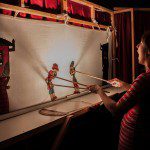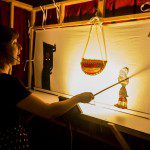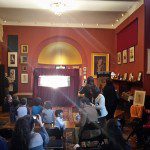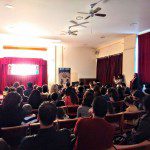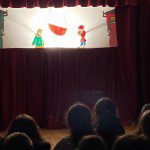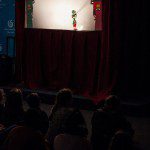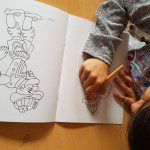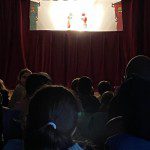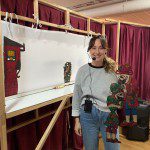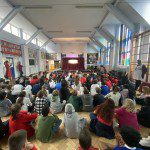The Project of Karagöz & Hacİvat
As Yunus Emre Institute London, we are proud to share our educational content project called ‘Karagöz & Hacivat’.
By launching this project, we aim to promote Turkish culture as well as establish a bridge between students coming from different cultural backgrounds. Our main aim is to provide a space where students are able to learn about the traditional Turkish show while being entertained at the same time. We strongly believe that the peaceful coexistence in our multicultural society relies on the understanding of other cultures and mutual respect.
In 2009, Karagöz and Hacivat was added to UNESCO’s Representative List of Intangible Cultural Heritage of Humanity. In recent years, the Yunus Emre Institute has promoted the play as part of an educational project to share Turkish culture. Within the scope of the project, over 35 plays in both English and Turkish languages have been performed for children in primary and secondary schools, various cultural institutions and museums in the UK including Riverley Primary School, Leighton House Museum, Dr. Fazıl Küçük Turkish School, Cambridge Turkish School, William Patten Primary School, Horizon Romsey Community Centre, TaPS Perspectives 2022 by the ISTA (International Schools Theatre Association), Mountview’s Peckham Open Sessions 2024 and continued to be performed online during the pandemic period. These shows are brought to life by award-winning theatre actress Mengü Türk who trained at the prestigious Bursa Karagöz and HacivatMuseum. Over the past five years, this project has met and continues to meet hundreds of students and parents.
Contact us to request the hosting form and for further details at londra@yee.org.tr
About the Traditional Shadow Play: Karagöz & Hacivat
Shadow plays have a long history of telling stories and entertaining audiences across many cultures. This traditional play of Karagöz & Hacivat was one of the most popular forms of entertainment in the Ottoman Empire and was played during the religious month of Ramadan, at festivals, coffee houses and public squares. Founded in the city of Bursa, the show emerged from the witty conversation between a mason, Hacivat, and a blacksmith, Karagöz, who are the main characters of the play. Karagöz represents the morals and common sense of society whereas Hacivat represents the educated, well-mannered, smooth-talking aristocracy. Each character tries to persuade and influence the other in their quest to solve everyday problems. The other characters include Celebi, the charmer; Beberuhi, the dwarf; Zenne, a woman; Mercan, the spice trader. There’s also a doctor, a scrap dealer, a boatman, poets, a handful of licentious women, and a host of other diverse and shady personalities. The play was prevalently played in Istanbul which later spread to other parts of Anatolia by the artists going on tours.
The Technique of the Shadow Play
The white screen on which Karagöz is shown on is referred to as the “ayna”, which means “mirror”, implying that the stories reflect aspects of people’s lives. Originally, the screen would measure 2.m by 2.5 m. but now it tends to be 80.cm high and 110 cm. wide. On the inner side, below the screen, there is a wooden ledge that holds cymbals, tambourines, canes, pipes and lamps to illuminate the screen. The characters are between 32 cm. and 40 cm. high and they are generally made from the skin of camel or cows. The leather is treated by a special method to make them translucent and rigid. Then detail is cut into them with sharp, pointed blades called “nevregan”. The designs are painted with Indian ink or root paints. The shadow puppets are made with moving parts and the separate parts are joined together with cord, nylon thread or catgut. Finally rods are added to control the puppets.
Synopsis of the Play: SWING
The Swing is an interactive traditional Turkish Shadow Play which has been fully adapted for children. Hacivat embarks on a new business hiring out a swing to passers-by and convinces Karagoz to become his less-than-eager business partner. Characters from far and wide give the swing a go but Hacivat, despite his promises to Karagoz, struggles to make a profit. While Celebi, Hacivat’s first customer, enjoys the swing and pays the full fee, Zenne falls down and does not pay a penny. Even a dragon comes from a faraway land to have a go but since he does not have any money he swings for free. Beberuhi, the last customer of the hapless Hacivat, tricks him and enjoys the swing for half of the usual fee.
Check out a snippet of our shadow play ⬇️
 Performer MEngü Türk’s Biography
Performer MEngü Türk’s Biography
Mengü Türk is a British/Turkish performer. She studied Acting at The Poor School. In 2013 she won the best actress award at Kosova, Shqip International Film Festival. Mengü has been working on voiceover projects and performing in short films, commercials, plays, and corporate projects since 2009.She has previously performed at the Soho Theatre, Arcola Theatre, Hackney Showroom, and Rosemary Theatre. She has also taught drama to people of various ages. In addition to this, she was also the recipient of a unique scholarship by Yunus Emre Institute London and had attended a week-long workshop on Turkish Shadow Play (Karagöz & Hacivat) in Bursa, Türkiye, in April 2018, focusing on the traditional Karagöz & Hacivat shadow play. She has since performed Karagöz & Hacivat in both Turkish and English on behalf of the Institute.
Important Note! Yunus Emre Institute London cannot be accounted for any incidents that occur during the show. The host institutions are responsible to take all necessary health&safety and security measures.
Photo Gallery
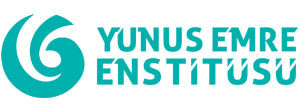
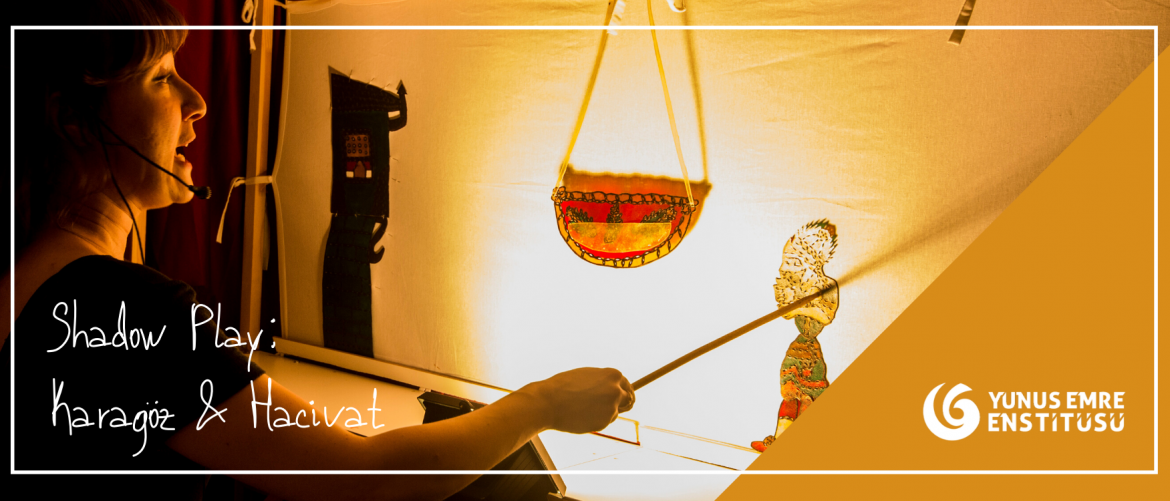
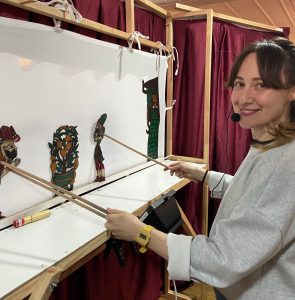 Performer MEngü Türk’s Biography
Performer MEngü Türk’s Biography

